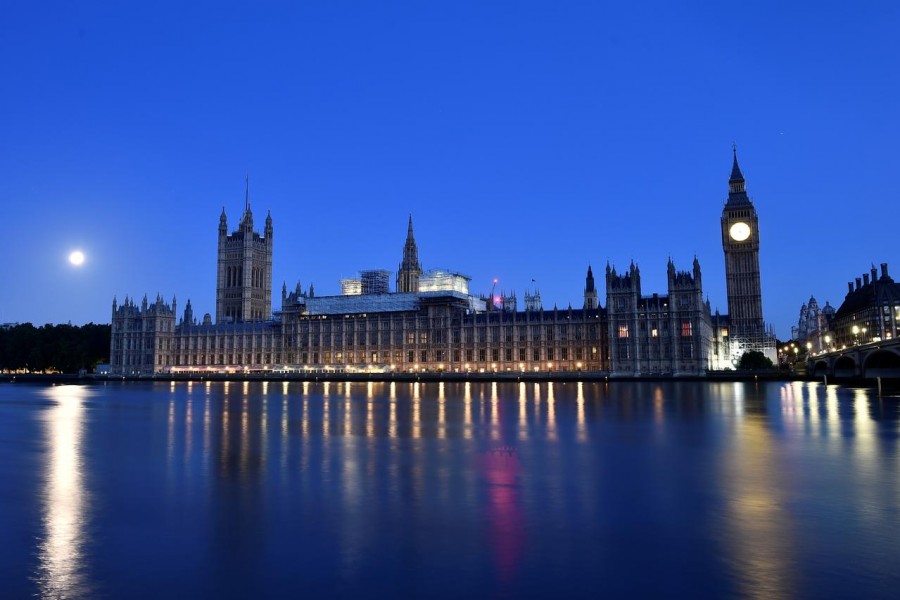Theresa May will attempt to get MPs to back part of her Brexit deal later, on the day the UK was due to leave the EU.
MPs will vote on the withdrawal agreement, which sets out the terms of the UK's departure from the EU.
Ministers say their backing is vital if Britain is to avoid a disorderly exit.
But Labour will vote against it, saying that denying MPs a say on the political declaration section of the deal, which outlines the shape of future UK-EU relations, is a "blindfold Brexit".
Shadow Brexit Secretary Sir Keir Starmer said it was a "desperate act" by the prime minister
"Take the political declaration off and it is completely blind - you have no idea what you are really voting for," he told BBC Radio 4's Today. "It makes a bad situation worse, it is the blindest of blind Brexits."
Friday's vote, if it passes, would secure a delay until 22 May.
It will not allow Parliament to ratify the entire withdrawal package, because the law allows this only after the passage of a "meaningful vote" on both parts of the deal.
The prime minister has already lost two such votes on the full deal by large margins, and Commons Speaker John Bercow had ruled out bringing the same motion back a third time without "substantial" changes.
However, the government says a vote on the withdrawal deal alone - the "divorce deal" - will be enough to meet the criteria laid down by EU leaders for the postponement of Brexit from 29 March to 22 May.
With Labour and the DUP planning to vote against it, the BBC's political editor Laura Kuenssberg said it looked like the prime minister was heading for another loss on Friday.
There are signs now that many Eurosceptic MPs are ready to say "yes" - not because they suddenly have realised Theresa May's deal is perfect, but because more of them officially realise that it is the clearest break from the EU they can realistically hope for.
Yet her Northern Irish allies are not persuaded. Labour, even though they have sometimes accepted that what's on the table - the divorce deal - will never be unpicked by the EU, will still, in the main, resist.
As things stand, even though some influential Brexiteers believe there is a chance it will get through, it looks like the prime minister is heading for another loss.
But for Number 10, it is another way of extending the road before it finally runs out.
Defence Minister Tobias Ellwood told BBC Newsnight: "There are some big challenges here.
"It's a key day and probably the last opportunity to get this particular motion across."
If the government is defeated, ministers will have until 12 April - the date by which the UK would have to indicate whether it would stand candidates in the 2019 European Parliament elections - to "indicate a way forward".
The withdrawal agreement sets out how much money the UK must pay to the EU as a settlement, citizens' rights, details of the transition period, and the controversial arrangements for the backstop, which seeks to prevent the return of customs infrastructure at the Irish border in the event no UK-EU trade deal is enforced.
Commons Leader Andrea Leadsom said approving it would ensure the UK leaves the EU "in an orderly way that gives businesses and people the certainty that they need".
"We don't want to be in the situation of asking for another extension and facing the potential requirement of participating in European Parliament elections," she said.
But she faced anger from some MPs. Labour's Mary Creagh described it as an "extraordinary and unprecedented reverse-ferret of the commitments that have been made... that we should have our say on both items together".
If the government wins the vote, it will either have to pass the political declaration on the future relationship at a later date, or change the law so that it is not needed to ratify the treaty.
Mrs May told Conservative MPs this week that she would not lead the talks with Brussels over the future relationship between the UK and EU and would resign as party leader after 22 May if her deal was passed, but stay on as PM until a new leader is elected.
While she has persuaded some Brexiteers to back her deal, she would need to win over 75 rebels to overturn the 149-vote rejection of her deal when it was last voted on, on 13 March.
'Time to decide'
Former Conservative party leader Iain Duncan Smith said he would reluctantly back the deal although he recognised there were "some fundamental flaws with this process".
He added: "I think it's time for us to take a decision, which is we want to leave, we want to be able to say to our constituents 'we have left, there is more that has to be done'."
But veteran Tory Brexiteer Sir Bill Cash told Today he believed there was "enough" opposition for the divorce deal to be defeated, BBC reports.
He said the fact Brexit was not happening on Friday was not due to rebels like himself but was the fault of the prime minister and "30 Remainers collaborating with Labour".
Labour said the prime minister's promise to resign meant the UK's future relations would be dictated by the outcome of a Conservative leadership contest.
"Even if the prime minister gave assurances about what she is going to do in the future, they don't mean anything anymore," Sir Keir told Today.
"We have accepted there is a need for a withdrawal agreement, but we never accepted we could ever vote for an exit document without knowing where we are headed."


